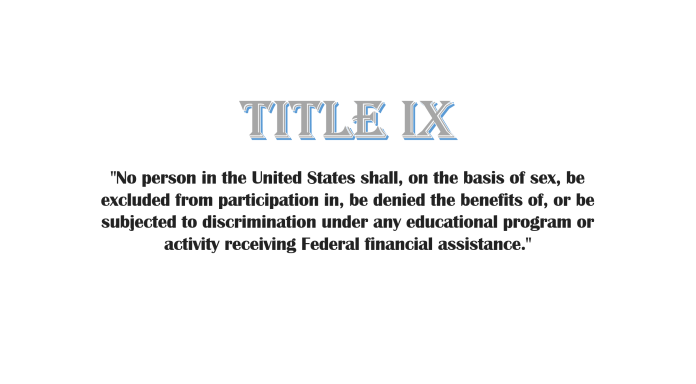By Sarah Lounsbury
Sports Capital Journalism Program, IUPUI
Since its passage in 1972, Title IX has altered the course of women’s sports.
It began with collegiate female athletes having the opportunity to receive athletic scholarships. Then even bigger advances came about through achieving equal pay across different professional sports such as men’s and women’s tennis and the United States Men’s and Women’s National Soccer Teams. Women broke down barriers in coaching, like Lori Locust of the Tampa Bay Buccaneers being the first female coach in the NFL to win a Super Bowl.
It’s safe to say these advances wouldn’t have been possible if it weren’t for Title IX.
Later in June will mark the 50th anniversary of the passage of Title IX, shortly after the Associated Press Sports Editors Summer conference takes place in Indianapolis featuring a panel discussion on this essential law.
The general session, “Silver Medals,” will be held Friday, June 17, at 2 p.m. in the Hine Hall Auditorium on the IUPUI campus. The panel will feature Butler volleyball coach Sharon Clark and journalists whose work has been featured in the Washington Post, New York Times, Sports Illustrated and the Indianapolis Star with moderator Naila-Jean Meyers of the Minneapolis Star Tribune. The panel will explore the ongoing importance of this law, where it has led us and what’s next.
“It’s important that journalists and others learn about the laws so they’re in the position to assert the rights of girls and women with Title IX,” said panelist Mark Hyman, the George Solomon Endowed Chair in Sports Journalism at the University of Maryland. “That’s why writing about these issues and educating the public and journalists on Title IX is so important.”
With a detailed understanding, reporters are equipped to tell the stories of female athletes and sports teams who have used Title IX as a reference to bring about change that may not have been imaginable in the minds of those who helped bring the law to life.
“The impacts of Title IX are an interesting continuum,” said Meyers. “If you were to talk to the women athletes from 50 years ago who were directly impacted by this idea of equal opportunity in education for athletics, I’m not sure they could’ve pictured the things we have now. I don’t know if these women would’ve imagined what we got the other day, which is equal pay for the United States Men’s and Women’s National Soccer Teams, which is a monumental moment in gaining equality in athletics.”
By shining a light on women’s sports, women athletes and sports teams are given the opportunity to alter any misconceptions the public may have.
“With Title IX, there’s so many misconceptions about it and a lot of those need to be clarified,” said panelist Dr. Pamela Laucella, who is an associate professor and academic director of the Sports Capital Journalism program at IUPUI. “I think the media needs to be committed to ending those misconceptions.”
As barriers are broken on the field, court and track, sports journalists need to be committed to giving women and minorities a seat at the table within sports media organizations, Laucella added.
“All organizations in the sports industry can benefit from hearing about industry issues, especially hiring practices,” she said. “Things are not going to change unless we have a diverse workforce at all levels in sports media from editors to journalists to owners to management.”
Not only is it essential for journalists to be committed to gender equality both in their reporting and in the workplace, but it’s also important that journalists consider how far academic institutions still have to go in becoming compliant with the Title IX, Hyman said.
“I would say the real progress remains in the improvements that are made for girls who are playing high school sports,” he added. “Better uniforms, more experienced coaches, more equitable scheduling, better publicity, those are the areas I think we are going to see real improvement moving forward. But it will only happen if boys, girls and parents continue to push for compliance with Title IX.”





